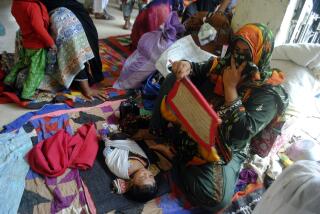Push to Repatriate Refugees Assailed by Conferees
- Share via
PRINCETON, N.J. — Worldwide impatience and demands for swift repatriation are hampering work with the refugees of Bosnia and Rwanda, humanitarian fieldworkers and policymakers declared at a conference at Princeton University this week.
Conference participants pleaded with politicians and the public to understand that speed is an enemy when dealing with the attempted resettlement of 27 million refugees throughout the world.
“Healing the wounds takes time,” said Sadako Ogata of Japan, the U.N. high commissioner for refugees. “Sometimes the international community becomes more and more impatient. Since the end of the Cold War, everything looks so horrible that people say: ‘Solve it now.’ ”
Attending the panel discussions were more than 100 U.N. and Clinton administration officials, representatives of the World Bank and the International Monetary Fund, and diplomats, professors, think tank analysts, private humanitarian workers and journalists.
The turnout reflected the prestige of the two conference organizers: Ogata and Olara A. Otunnu, a former Ugandan foreign minister who is now president of the International Peace Academy, a private research institution.
Ogata and Otunnu have been mentioned as possible successors to Boutros Boutros-Ghali after his term as U.N. secretary-general ends this year. Although Boutros-Ghali has announced his candidacy for a second term, Clinton administration officials have said that the United States will veto his bid.
The dilemma of Rwanda, where 1.7 million refugees are afraid to return home despite pressure that they do so, was set down starkly by Carrol Faubert, the former U.N. official in charge of Rwandan refugees.
“Repatriation is a condition for reconciliation,” he said. “But reconciliation is a condition for repatriation.”
By this, he means that the refugees, who are mainly Hutus, do not want to return because they are afraid the Tutsi-dominated government will exact revenge for the massacres of Tutsis in 1994. Yet he said that as long as so many Hutus remain outside their country, the two groups cannot forge the kind of cooperative links that would make Rwanda stable. Time is needed to ease the dilemma, he said.
According to official figures from Ogata’s office, there are 2.4 million displaced persons as a result of the now-ended 3 1/2-year conflict in Bosnia-Herzegovina, mostly Muslims afraid to go back to their homes in towns and villages now occupied by Serbs and Croats.
Conference participants argued that pressure, mainly from Washington, to keep the peace process on a rigid timetable is separating Bosnia into three units. This has made it nearly impossible to resettle refugees in their old homes, they said.
“What we are doing on the ground is reinforcing separation because we are in a hurry . . and we all know it,” said Susan L. Woodward of the Brookings Institution.
Many at the conference deplored the decision to conduct Bosnian elections as scheduled in September. The election returns, they said, will probably strengthen the separatists in each unit.
But the Clinton administration has indicated that it does not want a slowdown in the peace process because it could delay the departure of U.S. troops participating in the North Atlantic Treaty Organization-led peace implementation force in Bosnia.
The 1.7 million Rwandan refugees live in camps in Zaire, Tanzania and Burundi. Although 400,000 refugees returned to Rwanda in 1994, only 90,000 followed them in 1995. The push to repatriate the rest more swiftly comes from three sources: Their hosts want them out, the Rwandan government insists it is safe to return, and the industrial countries are tired of paying so much to care for them.
But Jan Pronk, the Dutch minister for development cooperation, decried those pressures. Noting that there are Afghan refugees who have lived in Pakistan since 1979, he said that there is “too much emphasis on a quick return for refugees” in Rwanda.
Pronk said that the Clinton administration had circulated a plan among European governments proposing that the United Nations close the present camps and relocate the refugees in new camps within Rwanda.
“This is an extremely risky plan,” Pronk said. “It could lead to violence. . . . To force things because it [the present refugee camp complex] is costly is the wrong, wrong approach.”
Faubert, the former head of the U.N. refugee agency in Rwanda, said, “We cannot continue to be locked into quotas and deadlines which are completely irrelevant.”
More to Read
Sign up for Essential California
The most important California stories and recommendations in your inbox every morning.
You may occasionally receive promotional content from the Los Angeles Times.













